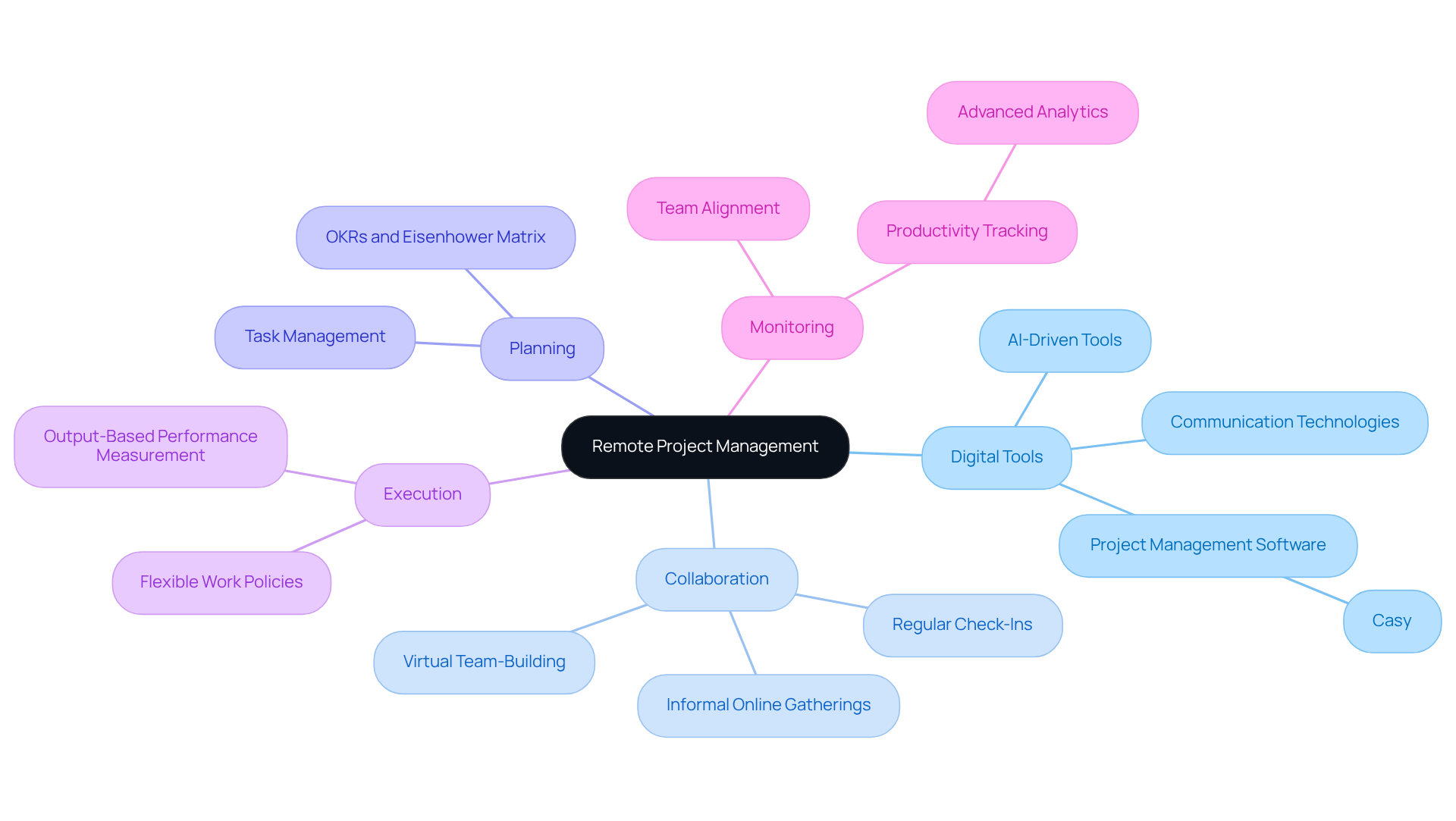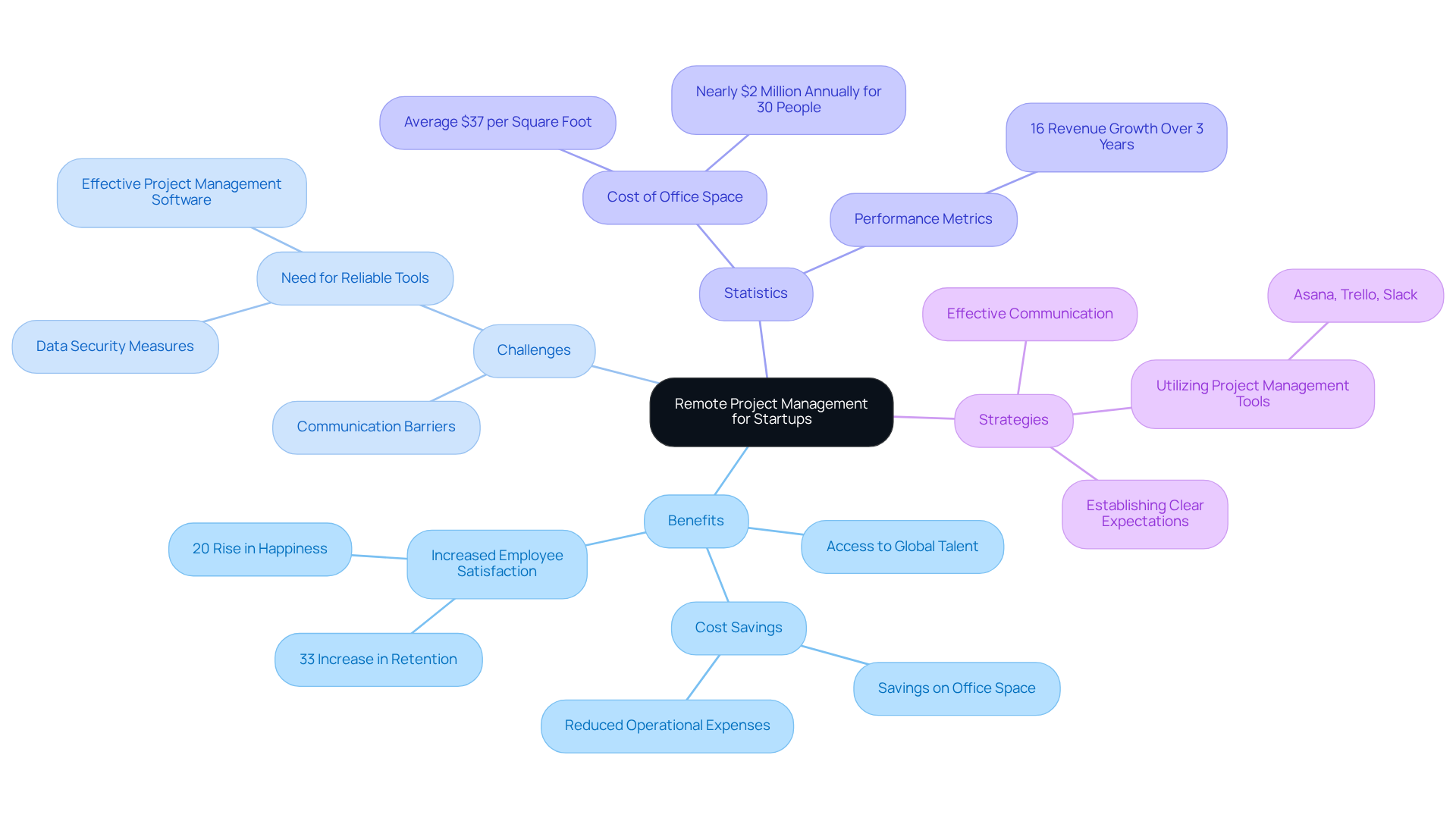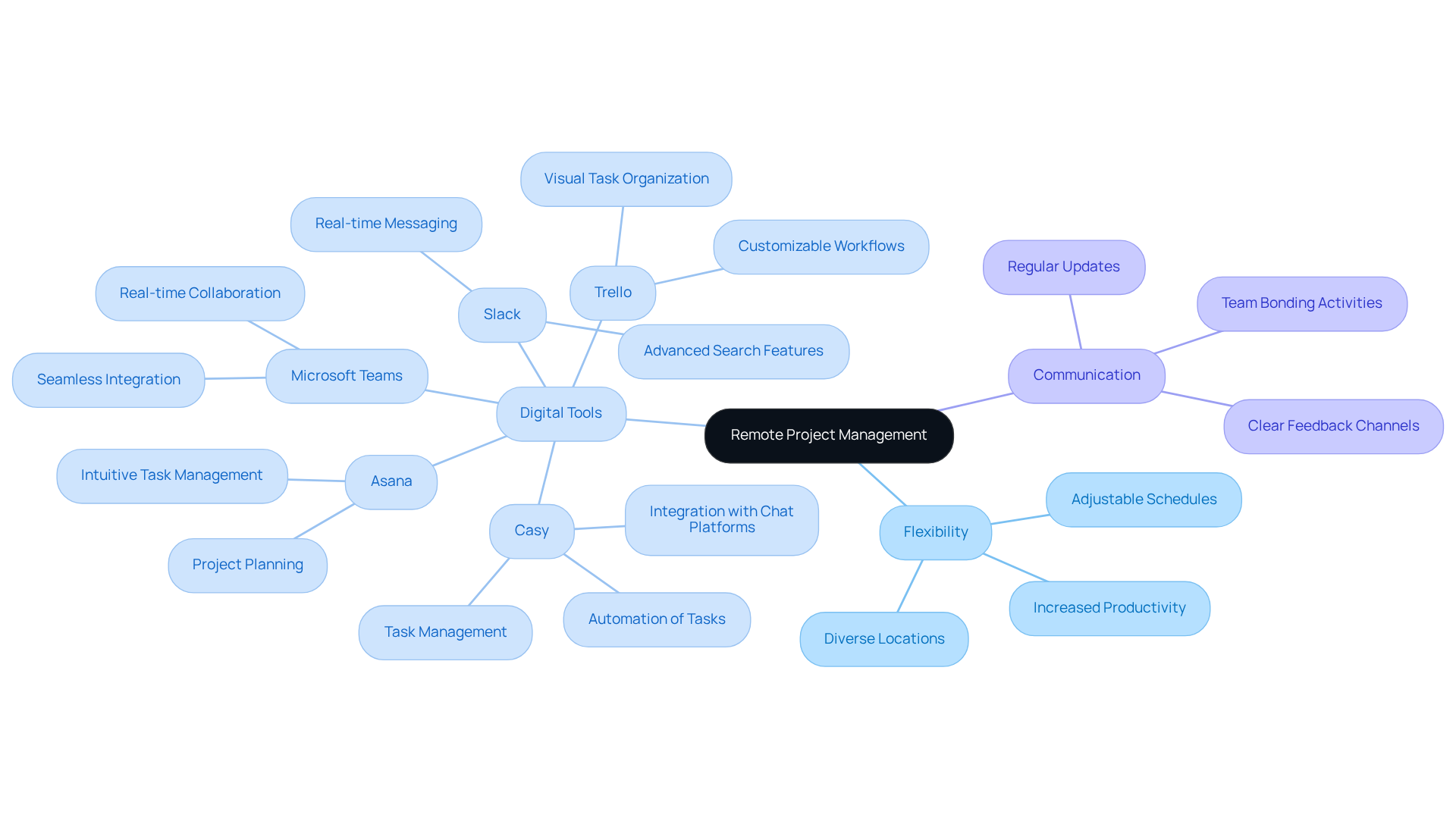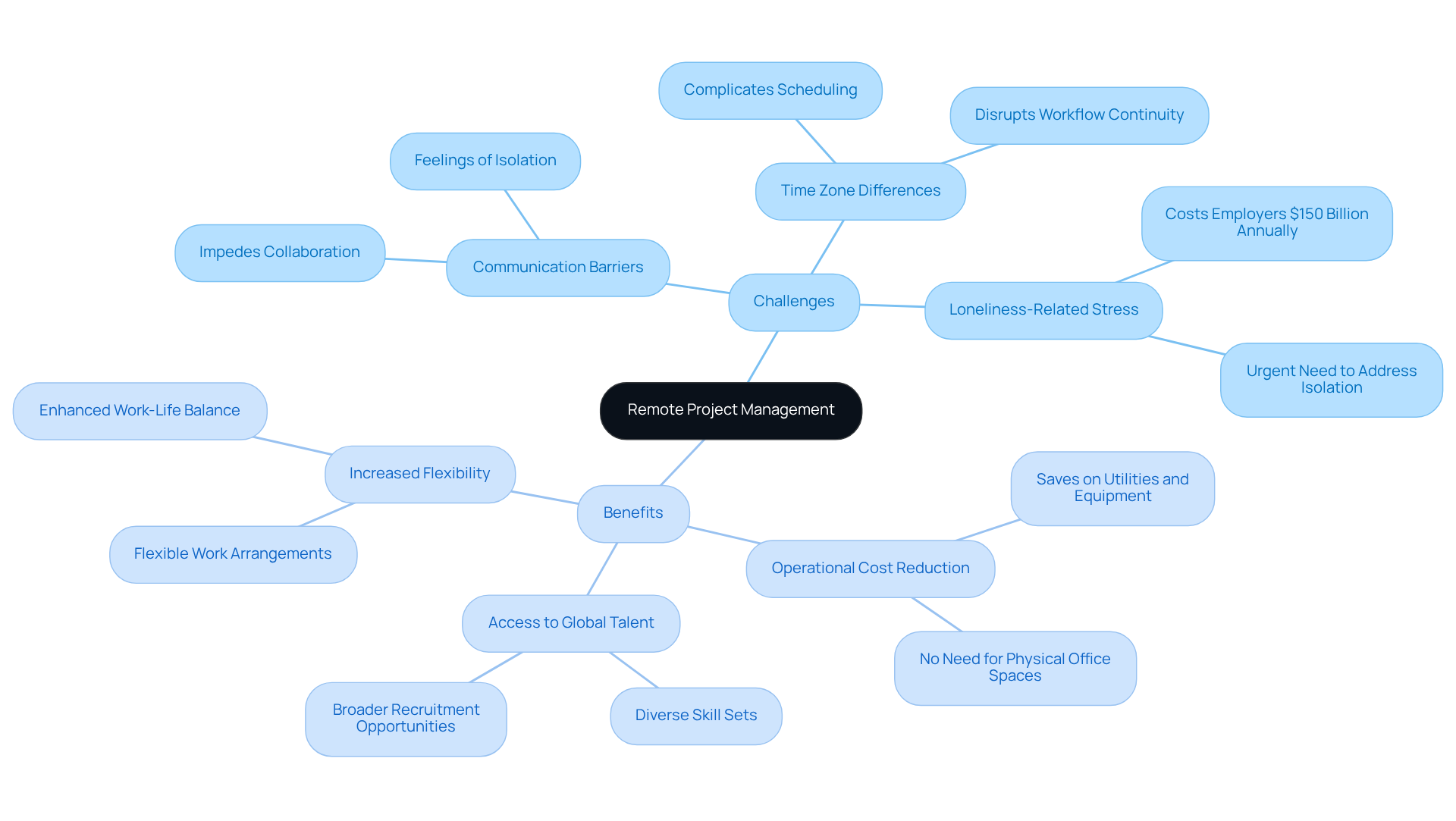Overview
Remote project management stands as a cornerstone for startups, enabling them to coordinate tasks efficiently while tapping into a global talent pool. This approach not only fosters flexibility and adaptability but also positions startups to thrive in a competitive landscape. Effective remote management can significantly reduce operational costs, enhance productivity, and cultivate a collaborative culture. However, it is crucial to navigate challenges such as communication barriers and time zone differences.
How can startups overcome these obstacles to maximize their potential? By embracing strategic remote management practices, they can unlock unparalleled opportunities for growth and innovation.
Introduction
Remote project management has emerged as a crucial practice for startups navigating an increasingly digital landscape. By leveraging advanced communication tools and flexible work arrangements, these businesses can tap into a global talent pool, enhance productivity, and significantly reduce operational costs.
However, the transition to remote management is not without its hurdles. Communication barriers, time zone challenges, and the risk of team isolation can complicate collaboration.
How can startups effectively overcome these obstacles to unlock the full potential of remote project management and drive their success?
Define Remote Project Management
Remote project management is the strategic practice of overseeing and coordinating tasks with team members who are geographically distributed. In today's fast-paced business landscape, remote project management leverages digital tools and communication technologies to enhance collaboration, monitor progress, and achieve objectives without the necessity of physical proximity. It encompasses planning, executing, and monitoring initiatives, ensuring that all team members remain aligned and informed, regardless of their location.
As telecommuting becomes increasingly prevalent, remote project management has become significantly important—especially in new business environments where flexibility and adaptability are paramount.
How can your organization harness the power of remote management to drive success?

Contextualize Remote Project Management for Startups
For new businesses, remote project management is not merely a trend; it is an essential requirement. The capacity to tap into a global talent pool empowers startups to recruit the best minds without geographical constraints. Furthermore, the adaptability of remote work enables teams to swiftly adjust to evolving task demands and market conditions. Operating within restricted budgets and schedules, startups find effective oversight crucial. By leveraging distance coordination tools, they can optimize workflows, lower operational expenses—such as the nearly $2 million annually for an office accommodating 30 individuals—and enhance productivity, all while fostering a culture of teamwork and creativity.
Businesses that embrace flexible work arrangements have reported a 33% increase in employee retention and a 20% rise in satisfaction, according to a study published in Nature in June 2024. As Rejoice Owoh, founder of My Tech Team, emphasizes, effective remote project management can mirror traditional techniques, highlighting the importance of communication and efficient task coordination for success. Moreover, telecommuting allows startups to operate across various time zones, ensuring uninterrupted workflow and customer support.
However, it is vital to acknowledge the challenges of distance collaboration, such as communication barriers and the need for effective tools. Investing in reliable internet solutions and data security measures is essential to ensure success. Are you ready to transform your startup's approach to task management and unlock new potential?

Identify Key Characteristics of Remote Project Management
Successful remote project management is characterized by flexibility, a strong reliance on digital tools, and a focus on communication. Flexibility empowers teams to operate from diverse locations and adjust their schedules, optimizing productivity. Digital tools, such as Casy, Trello, Asana, and Microsoft Teams, are vital in facilitating collaboration and task tracking, ensuring alignment among all team members. For instance, platforms like Slack enhance team communication and simplify task management. Moreover, AI-powered tools can anticipate risks in assignments and automate routine tasks, further boosting efficiency.
Effective communication is essential. Distance supervisors must establish clear channels for feedback and updates to avoid misunderstandings and sustain momentum. Additionally, challenges such as varying time zones and the absence of in-person supervision must be addressed to guarantee success. These traits foster a culture of responsibility and openness, enabling new businesses to thrive through effective remote project management. Are you ready to embrace these strategies and elevate your virtual management approach?

Examine Challenges and Benefits of Remote Project Management
Remote project management offers startups a unique blend of challenges and substantial advantages. Among the key challenges are:
- Communication barriers that can impede collaboration and feelings of isolation among team members, particularly in a virtual setting.
- Time zone differences that complicate scheduling and disrupt workflow continuity.
- Loneliness-related stress that costs employers over $150 billion annually, highlighting the urgent need to address isolation in remote work environments.
Yet, the benefits are compelling. Startups can:
- Significantly reduce operational costs by eliminating the need for physical office spaces.
- Gain access to a diverse global talent pool.
- Enjoy increased flexibility in work arrangements.
By employing efficient distance task coordination methods—such as frequent updates, precise goal establishment, and the use of collaborative resources—startups can enhance productivity and foster innovation.
As Rajat Mishra emphasizes, navigating the challenges of remote work with intentional strategies is essential for success. By proactively addressing these challenges and implementing structured routines, startups can fully harness the potential of remote project management to drive both growth and operational efficiency.

Conclusion
Remote project management stands as a pivotal element for startups striving to excel in a competitive arena. By adopting this strategic approach, emerging businesses can adeptly coordinate tasks, leverage global talent, and swiftly adapt to shifting market dynamics. The capacity to manage projects remotely not only boosts productivity but also cultivates a culture of collaboration, creativity, and flexibility—qualities essential for success.
Key insights have surfaced regarding the characteristics and advantages of remote project management:
- Startups can substantially lower operational costs.
- Enhance employee satisfaction.
- Sustain a continuous workflow across time zones.
However, challenges such as communication barriers and feelings of isolation must be proactively addressed to foster a cohesive team environment. Implementing dependable digital tools and encouraging open communication are crucial strategies for successfully navigating these challenges.
The potential of remote project management for startups is vast, providing an opportunity to transform conventional management practices. As the business landscape evolves, embracing these innovative strategies will not only enable startups to optimize their operations but also position them for sustained growth and success. The call to action is unmistakable: organizations must invest in effective remote management practices to unlock their full potential and propel their ventures forward in an increasingly digital world.
Frequently Asked Questions
What is remote project management?
Remote project management is the strategic practice of overseeing and coordinating tasks with team members who are geographically distributed, using digital tools and communication technologies to enhance collaboration and achieve objectives without physical proximity.
Why is remote project management important?
Remote project management is important as telecommuting becomes more prevalent, allowing organizations to adapt to new business environments where flexibility and adaptability are crucial.
What are the main components of remote project management?
The main components of remote project management include planning, executing, and monitoring initiatives to ensure that all team members remain aligned and informed, regardless of their location.
How can organizations benefit from remote project management?
Organizations can benefit from remote project management by leveraging digital tools to enhance collaboration, monitor progress, and successfully achieve their objectives in a distributed work environment.




